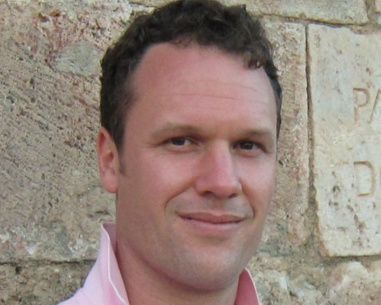
Alex Bremner wins Founders' award for his journal article.
A Gates alumnus has been awarded a prestigious prize for a journal article on colonial architecture.
Alex [George] Bremner, who studied for a PhD in the history and theory of Victorian architecture at Cambridge and was the first ever Gates scholar to be awarded a PhD, was presented with the Founders’ Award prize at the annual meeting of the Society of Architectural Historians in New Orleans in April. The award is given annually to a young scholar at the beginning of their career who has published in the Society’s peer-reviewed publication, the ‘Journal of the Society of Architectural Historians’. The journal is considered the world’s foremost scholarly periodical in the history of architecture.
At the ceremony, Alex was presented with an engraved crystal paperweight and a leatherbound certificate and citation for his article The Architecture of the Universities’ Mission to Central Africa: Developing a Vernacular Tradition in the Anglican Mission Field, 1861-1909.
The citation says: “Dr Bremner’s essay goes beyond even the high criteria for scholarly excellence that the committee set for the many excellent essays that were candidates for this year’s Founders’ Award.
“The Architecture of the Universities’ Mission to Central Africa addresses a little-studied topic – missionary architecture – in a little-studied geographical area – central Africa. More, it addresses this subject in a manner that is at once theoretically sophisticated and accessible, touching on and reformulating influential theoretical concepts common to colonial and post-colonial studies such as hybridity. Dr Bremner’s careful, well-documented study also breaks down disciplinary boundaries; in particular, it refuses to separate out high architecture from vernacular, appropriately treating the continuum of buildings, some “high architecture” and others “vernacular”, that were built by Anglican missionaries in central Africa in the second half of the 19th century. Theoretically sophisticated, solidly grounded in empirical research, and beautifully written, Dr Bremner’s essay offers a compelling model for the kind of scholarship SAH takes pride in recognising and celebrating.”
Alex, who was in the first intake of Gates scholars in 2001 and helped to set up the Gates Scholars’ Alumni Association, is now a senior lecturer in architectural history at the University of Edinburgh. He says his article relates to his postdoctoral work which led on from the PhD research he did at Cambridge. ““My PhD at Cambridge focused on London as an imperial city during the late nineteenth and early twentieth centuries. I grew up in Australia in an ex-colonial context, so I understood the colonial scene. I wanted to see how Britain regarded itself as an imperial power through its own architecture and urban environments. I wanted to trace these ideas from the periphery of empire back to the centre and out again. As a result, I subsequently became interested in understanding the role that religion played in constructing colonial identity.”
He is completing a book on the subject which will be published next year.












